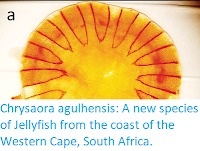Warnings have been issued to bathers in Ireland after Lion's Mane Jellyfish, Cyanea capillata, washed up on beaches in two parts of the country. The first was found on Malahide Beach in Fingal County, to the north of Dublin, on Friday 31 July 2020, with the second found at Buncrana on Lough Swilly in County Donegal the following day. The Jellyfish are potentially dangerous if
touched, as they can still sting when dead, though the stings are no
worse than those of Bees or Wasps, and not generally dangerous unless
people have an allergic reaction. The Jellyfish are far more dangerous
when encountered in the water, as their tentacles can entangle swimmers,
resulting in large numbers of stings, which can cause the swimmer to go
into shock and drown.
A Lion's Mane Jellyfish, Cyanea capillata, on Malahide Beach to the north of Dublin on 31 July 2020. Dublin Live.
The Lion's Mane Jellyfish is the largest known
species of Jellyfish, reaching over 2 m in diameter and with tentacles
that can be more than 30 m in length. They are exclusively found in
cooler temperate waters around the North Atlantic, North Pacific, Arctic
Ocean and Baltic Sea. They are pelagic, able to swim against currents
under their own energy, rather than drifting as many Jellyfish do, and
spend most of their lives in open water, but they move into coastal
waters towards the end of their annual life-cycle, when the (sexual)
medusae produce eggs, which in turn hatch into a polyp which attaches to
the seafloor in shallow waters, from which new medusae bud off
asexually.
See also...
Follow Sciency Thoughts on Facebook.







